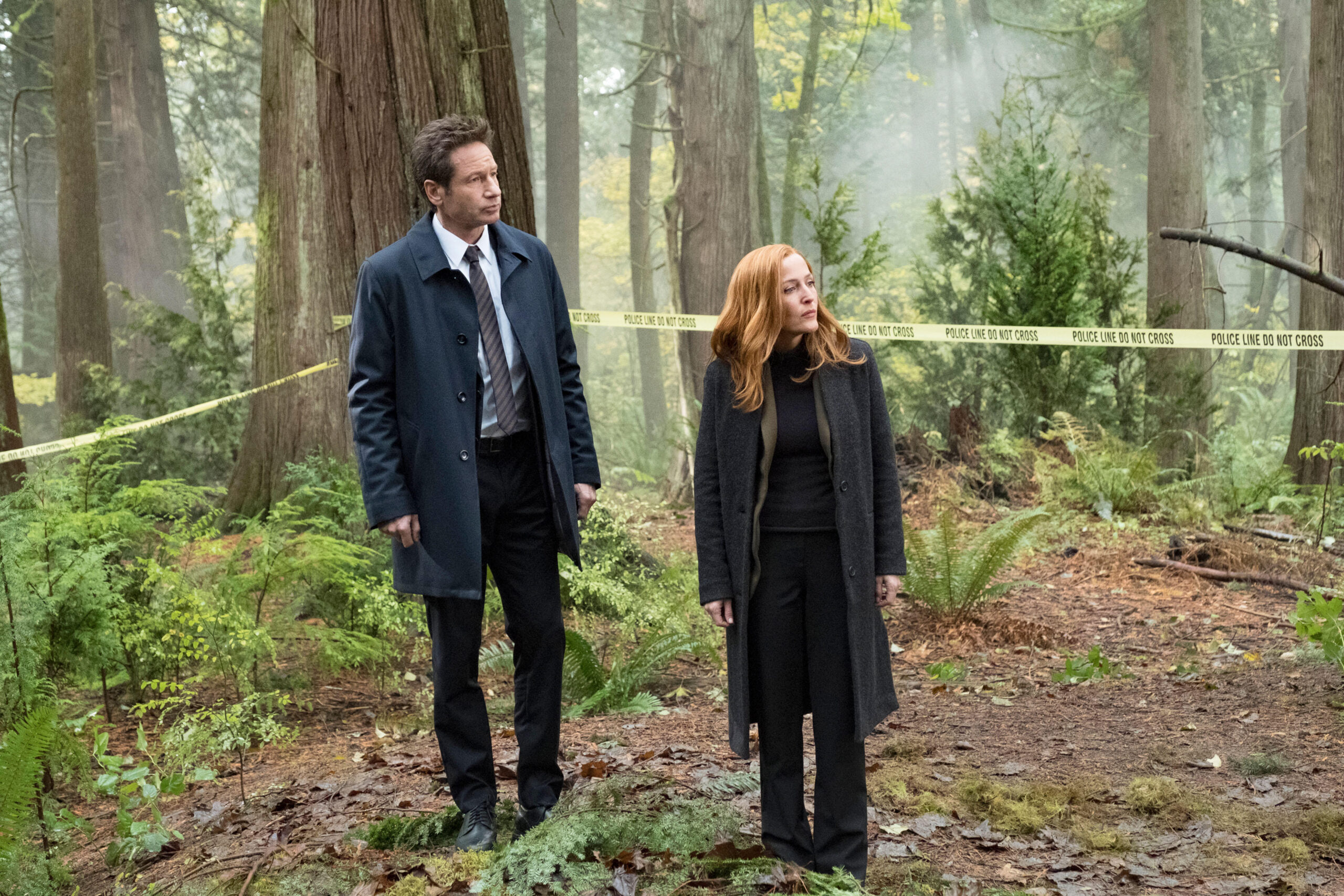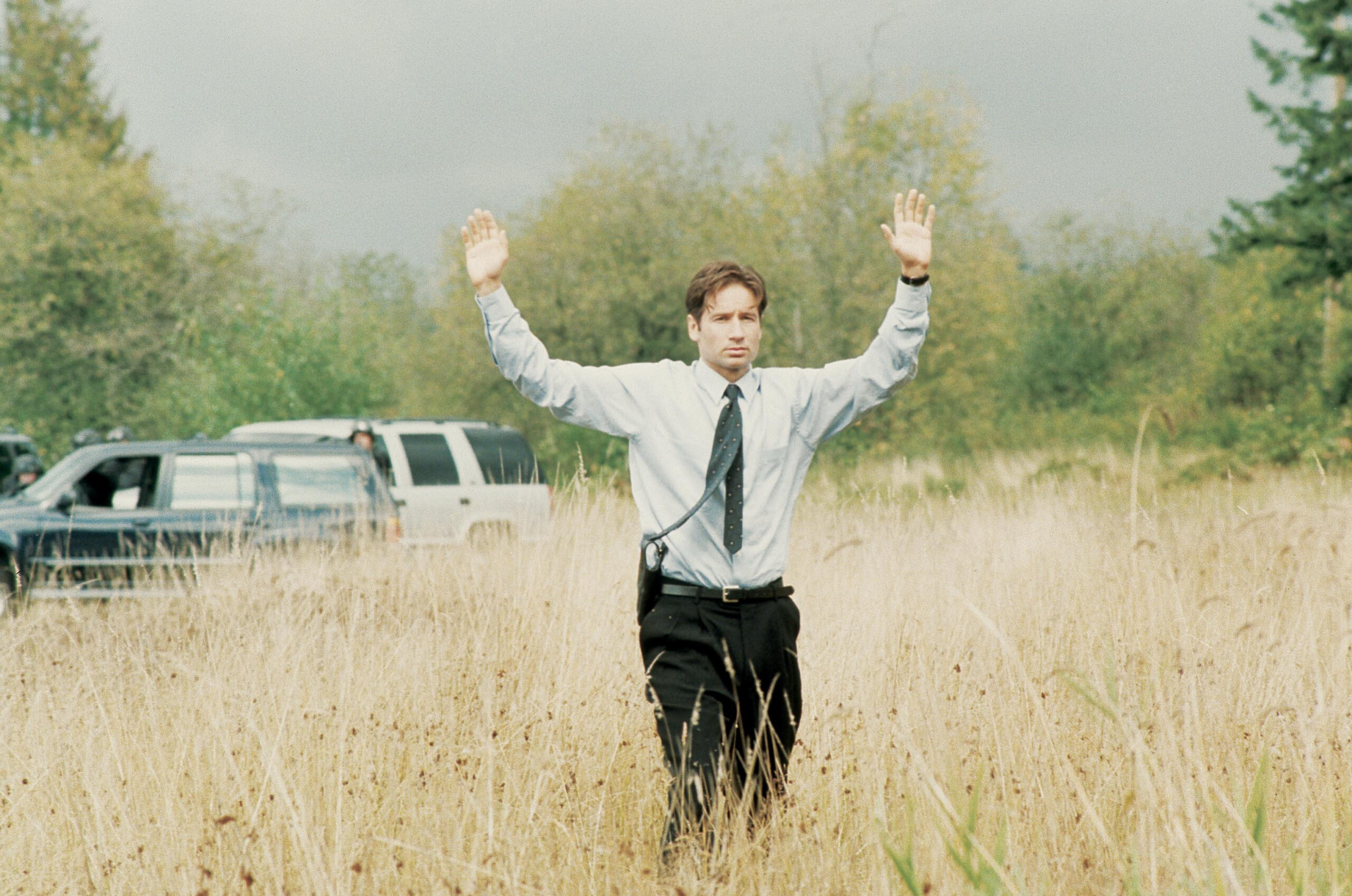It’s been nearly three decades since The X-Files star David Duchovny’s infamous spat with—seemingly—the entire city of Vancouver.
On October 14, 1997, Duchovny appeared on Late Night With Conan O’Brien in part to promote the Season 5 premiere of The X-Files. The talk show host asked the actor to comment on rumours that he wished to move the hit science-fiction series from Vancouver, where it had filmed since its first season, to Los Angeles, where Duchovny and his wife lived. Didn’t he like Vancouver?
“It’s a great city,” Duchovny said, “if you like 400 inches of rain a day.… It’s like being in an ice age rainforest.”
His words struck a nerve. By the next morning, the news was carrying the actor’s comments, as well as responses from X-Files fans, Vancouverites, politicians, and local business owners.
The version of the story that filtered through Canadian media into the public consciousness tells of a spoiled movie star slagging the city and local film industry that made him a star—or alternatively, a thin-skinned (and rainy) town railing at a public figure for telling the truth. Both versions ignore that Duchovny was participating in a comedy sketch, playing a version of himself heightened for comedic effect.
The full story is more nuanced and far more absurd, involving crying bears, the Reverend Al Sharpton, an incensed strip club owner, and a retired weatherman dressed as a tree. In other words, the truth is even farther out there.
It’s difficult to overstate the popularity of The X-Files in the mid to late ’90s. The show was a cultural phenomenon, with Duchovny and Gillian Anderson finding fame playing Fox Mulder and Dana Scully, a pair of FBI agents investigating cases of paranormal activity. The series blended police procedural with science fiction and horror, riding waves of public interest in aliens and Area 51, as well as the conspiracy theories found in films such as Oliver Stone’s JFK. Duchovny and Anderson were both talented and photogenic performers, gifted at drama and comedy, and sharing an onscreen chemistry somewhere between “good cop, bad cop” and “will they, won’t they.”
The duo was supported by a rich cast, including Canadians Nicholas Lea (Agent Krycek) and William B. Davis (The Cigarette Smoking Man). The show’s writing staff, led by creator and show runner Chris Carter, included Vince Gilligan, who went on to create Breaking Bad. Guest writers included Stephen King and William Gibson. The 1997-1998 season was the 19th-most-watched program in the U.S., higher than Law & Order and The Simpsons (on which Duchovny and Anderson guest starred as Mulder and Scully).
One important ingredient in the show’s uniquely spooky feel was its use of the Lower Mainland to double as locations across North America. According to Ken McIntyre’s Reel Vancouver, “Chris Carter fell in love” with Vancouver while location scouting for a suitable-looking forest for the pilot episode. The showrunner would call the city “Hollywood’s biggest back lot.” In the first few episodes alone, the city stood in for Washington, D.C., small-town Oregon, an Idaho air force base, a Baltimore tenement, a campground in Iowa, and the New Jersey Pine Barrens.
When The X-Files debuted, Duchovny was a character actor noted for small roles on Twin Peaks and in Beethoven, and as the lead on the erotic cable series Red Shoe Diaries. By 1997, four years into the show’s run, the former Yale English M.A. grad was a Golden Globe winner, newly married to actress Tea Leoni, and embarking on a film career as a leading man. The X-Files film Fight the Future (shot in L.A.) was released the following year.
Related stories
- In 1982, B.C. Played Host to a Bizarre, Daring Gun Heist on the Set of First Blood
- The Highlander TV Series’ Swashbuckling Path Through Vancouver
- An Emmy-Winning Prosthetic Makeup Artist in Vancouver Takes Us Behind the Scenes of Shōgun
“I’d just gotten married, and Tea lived in L.A., and I wanted to start a family,” Duchovny told The New York Times in 2015. “I couldn’t be in Canada 10 months out of the year.”
His appearance on Late Night With Conan O’Brien played off of statements Duchovny had made about possibly moving The X-Files production to Hollywood. In typical Late Night fashion, the bit began realistically before spinning into wild absurdism. O’Brien’s question about moving the show to L.A. provided a segue to a sight gag about how sad his audience would be: the camera then cuts to a hockey player, a Mountie, and a bear, all boo-hooing. (“I didn’t know bears actually cried tears,” Duchovny quipped). This was followed by representatives from various cities trying to woo Duchovny. A spokesperson for Vancouver (“Jacques MacDonald”) drones on about “the mountains and the harbour,” a delegate from the Republic of Chad makes a joke about Duchovny undergoing female circumcision, and the Reverend Al Sharpton, representing New York, comes out to say that the Big Apple has the best protests in the world: “The only protest you can get in Vancouver is from those people who can’t get out of Vancouver!”
In most news stories, all that was reported of Duchovny’s appearance was his comment about “400 inches of rain.” Even more unfairly, it was stripped of the comedic context and presented as a blunt reflection of his sincere feelings. While his wish to move the show to Los Angeles was real enough, Duchovny made several positive comments about Vancouver during the same Late Night appearance—and would make many, many more as the level of outrage rose.
How genuine was this outrage? Many Vancouverites recognized the comments as a joke, but others thought the city’s reputation was at stake—along with millions of dollars. The X-Files was not only a popular show but also part of a universe involving films, spinoffs (The Lone Gunmen), and sister shows (Millennium). Losing The X-Files would mean a loss of both jobs and industry prestige. “I don’t recall [the loss] causing a substantial drop in work coming to Vancouver,” says Dennis Heaton, the veteran showrunner of Motive and The Order, “but at the time, I remember a lot of people in the industry taking it like a bit of a thumb to the eye.”
Others took the comments more personally. “Dry your eyes, David, it’s only rain,” proclaimed The Province‘s front page on October 16, two days after the fateful Late Night appearance, calling the actor a “turncoat.” A local business went even further: “Hey! David Duchovny,” an ad for the No5 Orange strip club read: “After All We’ve Done For You, You’re BARRED. Believe It, If You Show Your Face In Here We’ll Throw You Out!”

David Duchovny and Gillian Anderson as Mulder and Scully in 2018, back in B.C. for The X-Files reboot. Photo courtesy of the Everett Collection.
The bad feelings created what Duchovny described during his next appearance on Late Night as “a living hell for about eight months.” His house was egged, he made countless apologies, and he participated in an embarrassing skit cooked up by Tourism Vancouver.
A week after the Late Night appearance, Duchovny was interviewed by a retired weatherman dressed as a “rainforest princess” defending the honour of the city. The princess presented the actor with a Vancouver Survival Kit of rain gear and local produce. The awkwardness of the bit and the fact it was filmed for international newscasts led The Province to call it “a hokey damage control stunt” and “a spin doctor’s nightmare.” “I love this city. I don’t know what’s going on,” a visibly uncomfortable Duchovny said to the news crew, adding, “I’ll stay here as long as you keep this man away from me.”
Does Vancouver’s weather affect shooting schedules that much? “It does slow you down,” Heaton states, “because now you have to factor protecting gear from the elements, reset hair, makeup, and wardrobe more often, redirect resources to keeping executive producers dry, et cetera.” On a Jimmy Kimmel Live! appearance decades later, Anderson mentioned that the time spent on set waiting for her hair to dry often slowed production and created tension with her co-star. “It’s very moist in Vancouver,” Anderson said. “My hair gets very frizzy.… Between every single take, we’d have to stand there and blow-dry my hair again.… It added to the tension.”
Duchovny ultimately got his wish, and Season 6 moved The X-Files to Los Angeles. While the show had strong episodes in its later seasons, it went off the air after Season 9, to be resurrected by a second film, The X-Files: I Want to Believe, and then two reunion seasons in 2016 and 2018—all shot in and around Vancouver. “It was like a global phenomenon before the Internet,” Duchovny said on his Fail Better podcast, as he and Anderson reminisced about their time on the show.
A slip of the tongue, a deliberate insult, or a joke taken out of context? Duchovny’s “400 inches of rain” remarks were amplified and distorted for years to come, like Mulder and Scully’s redacted and buried field reports. In Duchovny’s case, there was no shadowy conspiracy, simply a confluence of events between a media hungry for gossip, a cutting-edge talk show host, an actor playing a heightened version of himself for laughs, and a city that can be surprisingly thin-skinned about its weather.
After all, it does rain a lot up here.
Read more arts stories.









